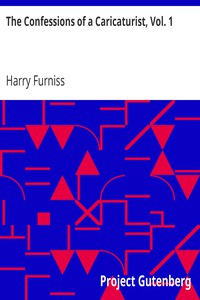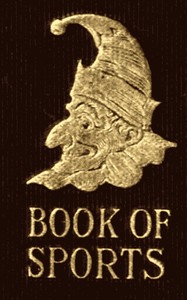The Confessions of a Caricaturist, Vol. 2, Harry Furniss [affordable ebook reader txt] 📗

- Author: Harry Furniss
Book online «The Confessions of a Caricaturist, Vol. 2, Harry Furniss [affordable ebook reader txt] 📗». Author Harry Furniss
That name was originated some years before by Mr. Burnand and myself jointly in a chaffing conversation. It was universally connected with me, but as it has been said that I had no right to use it, I here reproduce a document that settles any doubt on that point:
"This is to certify that Harry Furniss has the sole right to use the name of 'Lika Joko.' That he is at liberty to use it in any way he wishes, and no one else can adopt or utilise the name without his permission.
"(Signed) F.C. Burnand, Editor of Punch.
"Philip Leslie Agnew,
"For the Proprietors."
Wishing to be certain that the name "Lika Joko" was a wise one, I was advised to consult the leading editor of our largest publishing house. Strange to say, when I called he had on his wall rows of titles of publications under consideration. He looked at mine, and thought the matter over, then shook hands and told me there was a fortune in the title alone.
A few years afterwards I heard to my dismay that the same great man declared the title I had selected was a fatal mistake!
The first friend I consulted about capital suggested £20,000. He was very rich, but said that he would only put cash in equal to what I myself would. I put down £5,000, and he followed suit. I subsequently added more. The rest of the capital was found by various friends.
My friends subsequently said that as I supplied the editorial[Pg 276] brains I ought not to have supplied the largest share of the capital!
I was requested by my friends to introduce a business man, accustomed to publishing, and leave all business arrangements to him. My friends brought in two. Yet I am held responsible for the business arrangements made!
Few new periodicals have caused more interest. The scene at the railway stations and book-stalls was unparalleled. We could not print quick enough to supply the demand. 140,000 copies went off in a few days—which, for a threepenny humorous journal, is a record.
It is said I wrote the journal myself. I never wrote one line in it from the first number to the last. I had the best writers money could procure, and I venture to say it was the best-written paper of its class ever produced in England.
It is said I illustrated it all myself!
I had in the first number alone George du Maurier, Bernard Partridge, Fred Barnard, A. C. Corbould, W. Ralston, J. F. Sullivan, G. Ashton, W. D. Almond, J. B. Yeats, and myself. Ten artists!—eight of whom have contributed to Punch. In subsequent numbers I added work by Sir Frank Lockwood, Arthur Hopkins, Gordon Browne, W. Maud, W. F. Thomas, C. Richardson, Louis Wain, G. Montbard, James Greig, "Rab," Max Cowper, J. H. Roberts, René Bull, S. Adamson, J. E. Donnison, W. H. Overend, Charles Burton Barber, A. T. Elwes, Hal Hurst, F. Miller, E. F. Skinner, George Morrow, J. Jellicoe, A. Greenbank, and others—in all nearly forty artists, and this in six months!
I have another inaccuracy to nail to the counter of Dame False Rumour's shop. That I stopped Lika Joko because it was a failure.
The facts about this incident are brief and instructive.
Mr. Astor stopped his artistic weekly, the Pall Mall Budget, suddenly. It so happened it was printed in the same office as Lika Joko. This very paper, which had prevented me accepting the editorship of the proposed new sixpenny weekly paper, and had driven me into publishing a threepenny[Pg 277] weekly, was "put to bed" (to use a printer's phrase) week after week side by side with mine. I was sent for one Saturday morning. The expensive sixpenny child was to die that day. Could I not adopt it? There was a chance—splendid circulation, splendid returns for advertisements.
Why then does Mr. Astor discontinue it?
Because, I was told, Mrs. Astor had just died,—it was so dear to her that Mr. Astor felt he could not continue it, for purely sentimental reasons.
This was pathetically explained to me. It was so natural. Yet why should such a splendid paper cease when I had a large proprietor with capital waiting to start one? I was the man. So I was told, and so I believed, and so I proved to be. Not a moment was to be lost. I was with Sir George Lewis. Has Mr. Astor any objection? He thought certainly not.
I therefore engaged the same staff, the same printers, the same paper and machines were used. The paper, with the exception that the title was changed from the Pall Mall to the New Budget, came out in four days—the following Wednesday morning. Sir William Ingram was the first to purchase a copy. The whole edition was sold out before sunset. I have been assured that this was the smartest journalistic feat on record.
I then sought the people whom I had advised not to oppose this very paper, but they were on the Continent. I would bring it out and await their return. They did return. But it unfortunately happened that in the meantime they had speculated in one of those American imported "booms" of illustrated literature and lost!
Lika Joko came out too, and I immediately met all the members of my company and placed both papers before them, my New Budget and our joint property Lika Joko. The result was the following announcement in the next week's issue of the latter:
"A FAREWELL FABLE."Once upon a time there was a wealthy shipowner who possessed one of the best vessels on the seas. Her name was the Pall Mall Budget. Week after week she left port, well[Pg 278] manned, well rigged, laden with passengers, and made a prosperous voyage. No vessel in her own line was better built and appointed, and gradually she drew away those people who once had travelled by her rivals, and carried them herself.
"And then, one day, without assigning any reason, the shipowner forbade her ever again to leave port, and nothing could shake his resolve.
"Now, there was at this time also afloat a merry little passenger boat which made a weekly cruise in waters only occasionally entered by the larger vessel, and her name was Lika Joko. No sooner did the news of the great shipowner's decision reach the ears of the captain of the Lika Joko than he made all sail for port, drew up alongside of the Pall Mall Budget, and boarded her.
"Then he asked her captain and crew, who were all regretful at the loss of their vessel, if they would put to sea again in a vessel built by himself, as like the Pall Mall Budget as might be, but, if anything, swifter, more trim, with later improvements to make the passage easier and more entertaining to all on board. And they agreed.
"Forthwith he set about giving his orders, and so heartily did everyone work that a week later, in fair weather, and to the surprise of all spectators, this vessel, which was christened the New Budget, crossed the harbour bar and made one of the best passages on record, leaving the competing craft far behind, and carrying on board not only the old passengers of the Pall Mall Budget, but those of the Lika Joko as well, and many new ones. 'Henceforth,' said the captain of the Lika Joko, who had now become the captain of the New Budget, 'we will set our sails every Thursday morning.'"
Little did I think the change was a fable. I had not long to wait to find I had been utterly deceived. According to Mr. Astor, his reason for his stopping his expensive paper was not as stated! As soon as I discovered this I called together my friends, and as they would have to supply a huge capital to carry on the Budget, and as I had been deceived, it was[Pg 279] arranged that they should retire with their unused capital, and I carried on the New Budget with my own capital of £6,000. The paper cost me £100 a day—£700 each number. I had the best artists, the best writers, the best printers—the same as Mr. Astor—but here comes in my difficulty. As I had amalgamated Lika Joko with the New Budget, I was legally bound to the contract made with the advertising manager. That contract worked out in nearly every case at 40 per cent. commission for advertisement. That finished me. Was that editorial or business? I think the latter. Was I to blame? I think not.
As the American millionaire had discovered before me that it was impossible to give a shillingsworth for sixpence (although I ran it for a longer period than he did), I ceased its publication. Few papers, it has been said, were more admired than this artistic and refined New Budget, and I take this opportunity of denying that it was in any way a failure compared with papers in existence for years still losing money, and I am sincerely proud of my contribution to the publishing of periodicals. But had I not been deceived, and dropped Lika Joko, that paper would now have been a splendid property.
I confess that the financial loss, severe to a professional man who has made it all by his own hand, was not what upset me. I am not a gambler—I never bet a shilling in my life—but I thought better of my fellow-men than they deserve. What did trouble me was that I never was given credit for my pluck. I was, and I am still, grossly misrepresented by a certain section of journalists. When the Pall Mall Budget was discontinued, was it written down a failure? No, certainly not. A pathetic excuse was manufactured. That excuse was as clever as it was untrue, as I discovered to my cost.
I think the man who stepped in single-handed, saved the Pall Mall Budget as I did to the benefit of contributors, printers, and paper-makers, who then strangled his own child-paper and gave all the money at his disposal to keep the Budget going, who was deserted by his Company in consequence—they taking with them their remaining capital—who fought on, and lost thousands[Pg 280] and thousands of pounds more of his own money, who worked night and day for months without any encouragement, any return, who discovered he had been deceived all round, and then, finding this, paid everyone every penny and said nothing, but turned round and went on with his own professional work, is surely a man at least to be respected; certainly not the man to be belittled, misrepresented, and maligned by brother workers.
I have other matters to confess regarding my experiences of publishing—but they will keep. I am anxious, however, that the facts recorded in this chapter should be known, as a warning to others who like myself, being a successful editor, imagine that editing can make a commercial success without a commercial pilot. I paid for my experience—I do not regret it.

[A] Soden's "Rap at the R.A."
BRADBURY, AGNEW, & CO. LD., PRINTERS, LONDON AND TONBRIDGE.
End of the Project Gutenberg EBook of The Confessions of a Caricaturist, Vol 2 (of 2), by Harry Furniss




Comments (0)